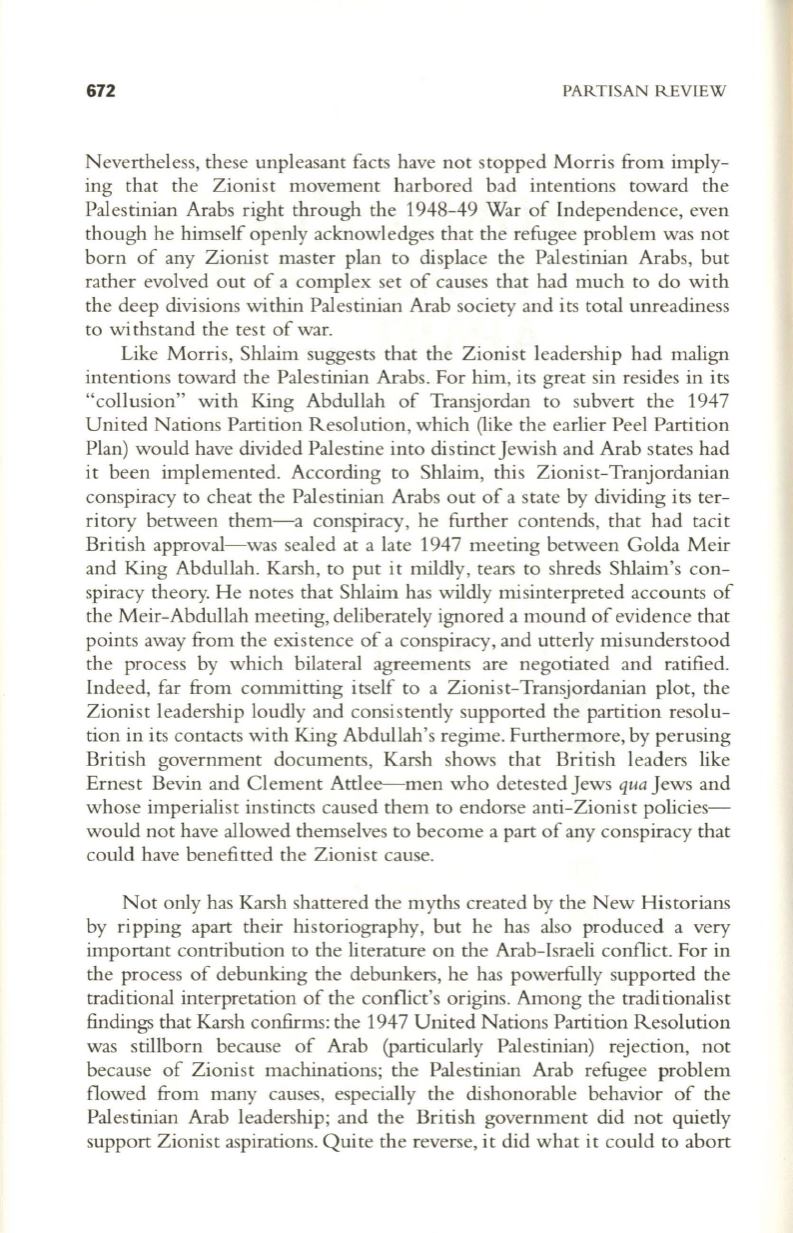
672
PARTISAN REVIEW
Nevertheless, these unpleasant facts have not stopped Morris from imply–
ing that the Zionist movement harbored bad intentions toward the
Palestinian Arabs right through the 1948-49 War of Independence, even
though he himself openly acknowledges that the refugee problem was not
born of any Zionist master plan to displace the Palestinian Arabs, but
rather evolved out of a complex set of causes that had much to do with
the deep divisions within Palestinian Arab society and its total unreadiness
to wi ths tand the tes t of war.
Like Morris, SWaim suggests that the Zionist leadership had malign
intentions toward the Palestinian Arabs. For him, its great sin resides in its
"colIusion" with King Abdullah of Transjordan to subvert the 1947
United Nations Partition Resolution, which (like the earlier Peel Partition
Plan) would have divided Palestine into distinct Jewish and Arab states had
it been implemented. According to SWaim, this Zionist-Tranjordanian
conspiracy to cheat the Palestinian Arabs out of a state by dividing its ter–
ritory between them-a conspiracy, he further contends, that had tacit
British approval-was sealed at a late 1947 meeting between Golda Meir
and King Abdullah. Karsh, to put it mildly, tears to shreds SWaim's con–
spiracy theory. He notes that SWaim has wildly misinterpreted accounts of
the Meir-Abdullah meeting, deliberately ignored a mound of evidence that
points away from the existence of a conspiracy, and utterly misunderstood
the process by which bilateral agreements are negotiated and ratified.
Indeed, far from committing itself to a Zionist-Transjordanian plot, the
Zionist leadership loudly and consistently supported the partition resolu–
tion in its contacts with King Abdullah's regime. Furthermore, by perusing
British government documents, Karsh shows that British leaders like
Ernest Bevin and Clement Attlee--men who detested Jews
qua
Jews and
whose imperialist instincts caused them to endorse anti-Zionist policies–
would not have allowed themselves to become a part of any conspiracy that
could have benefitted the Zionist cause.
Not only has Karsh shattered the myths created by the New Historians
by ripping apart their historiography, but he has also produced a very
important contribution to the literature on the Arab-Israeli conflict. For in
the process of debunking the debunkers, he has powerfully supported the
traditional interpretation of the conflict's origins. Among the traditionalist
findings that Karsh confirms: the 1947 United Nations Partition Resolution
was stillborn because of Arab (particularly Palestinian) rejection, not
because of Zionist machinations; the Palestinian Arab refugee problem
flowed from many causes, especially the dishonorable behavior of the
Palestinian Arab leadership; and the British government did not quietly
support Zionist aspirations. Quite the reverse, it did what it could to abort


